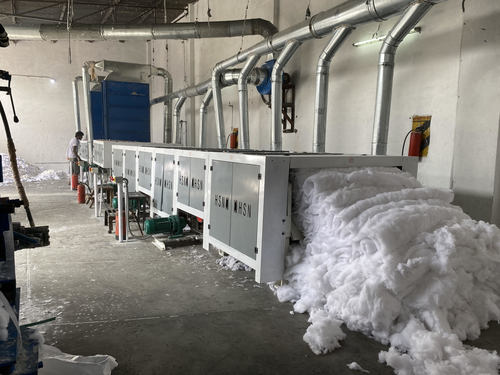Understanding the Cost of Fabric Recycling Machines
In an era where sustainability is becoming a key focus for industries worldwide, fabric recycling has emerged as a crucial component in reducing waste and conserving resources. Fabric recycling machines play a vital role in this process by transforming used textiles into reusable materials. However, the cost of these machines can vary significantly based Fabric Recycling Machine price on several factors. This article explores the various aspects that influence the price of fabric recycling machines and provides a general overview of the price range you might encounter.
Factors Influencing the Price of Fabric Recycling Machines
- Type of Machine:
- Basic Shredders: These are designed for simple fabric shredding and have lower costs, generally ranging from $10,000 to $50,000. They are ideal for smaller operations or preliminary processing.
- Advanced Textile Recycling Machines: Machines that can handle more complex processes such as sorting, cleaning, and separating fibers are more expensive. These can range from $50,000 to $200,000 or more.
- Fully Automated Systems: High-end models with automation capabilities, including integration with other processing technologies, can cost upwards of $500,000.
- Capacity and Throughput:
- Machines designed for high-volume processing have a higher price tag. The capacity of a fabric recycling machine, usually measured in tons per hour, directly impacts its cost. Higher capacity machines, which can handle larger volumes of textile waste, tend to be more expensive.
- Technology and Features:
- Advanced Technology: Machines equipped with the latest technology for efficient separation and cleaning of fibers are pricier. Features such as automated sorting, intelligent control systems, and energy-efficient operations contribute to higher costs.
- Customization: Tailored solutions to meet specific needs of a business, including custom-built machines, can also increase the overall price.
- Brand and Manufacturer:
- Reputable brands and manufacturers often charge a premium for their machines due to their reliability, service, and support. It’s important to consider the brand’s reputation and after-sales service when evaluating costs.
- Maintenance and Operating Costs:
- The initial purchase price is just one part of the overall cost. Ongoing maintenance and operational costs should also be factored in. Machines with lower maintenance requirements and better energy efficiency might have a higher upfront cost but can save money in the long run.
- Geographical Location:
- The price of fabric recycling machines can vary based on the region due to factors such as shipping costs, local taxes, and import duties. Machines purchased from international suppliers may incur additional costs related to importation.
General Price Ranges
- Small-Scale Units: For small businesses or startups, basic fabric shredders and initial recycling machines generally fall in the $10,000 to $50,000 range.
- Mid-Range Machines: Mid-sized operations looking for more advanced features and higher capacity can expect to pay between $50,000 and $150,000.
- High-End Systems: Large-scale facilities or those requiring state-of-the-art technology and high throughput capabilities should budget $150,000 to $500,000 or more.
Conclusion
The price of fabric recycling machines is influenced by a multitude of factors including the type of machine, its capacity, technological features, and the brand. While initial costs can be significant, investing in the right machine is crucial for achieving efficient and sustainable fabric recycling processes. It’s essential for businesses to carefully evaluate their specific needs, consider long-term operational costs, and choose a machine that offers the best balance between cost and functionality.
